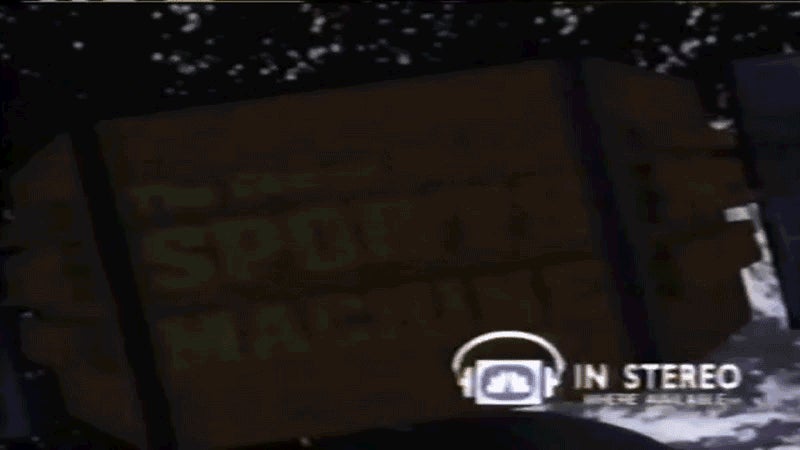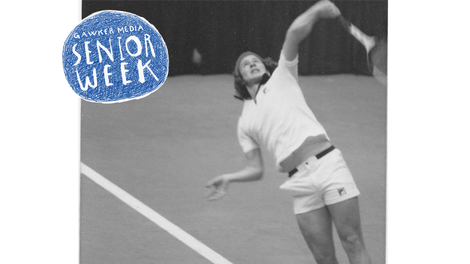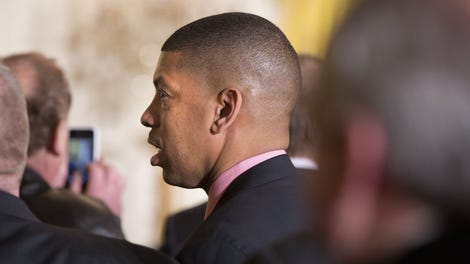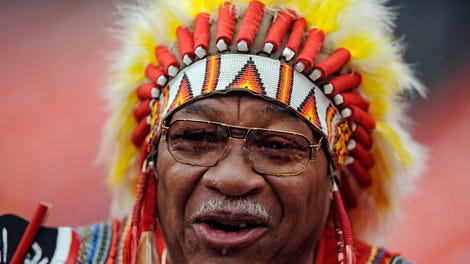
Six years ago, the New York Times appended a correction to its obituary of George Michael, the sportscaster who pushed those big buttons on The Sports Machine, saying the original piece had “omitted three survivors.” The paper blamed the error on “information provided by a family member.”
I’d seen obit corrections over a name misspelling or résumé omission before, but never anything that screamed “Dysfunction!” quite as loudly as this. I wrote up the correction for Washington City Paper, a D.C. weekly where I worked. “There’s a real sad story in there somewhere,” I had it.
My phone rang right after. “I’m that sad story,” said the caller. Now, she’s ready to tell that story: Cindi Michael’s self-published memoir, The Sportscaster’s Daughter, came out this week.
As it turns out, a decades-old family feud distorted the story of George Michael’s life. Cindi Michael, George’s daughter, and her two kids were left out of the Times obit. They also didn’t show up in appreciations that ran in ESPN, the Associated Press and the Washington Post—all because that’s the way George Michael wanted it, according to the new book. In Cindi’s version, he cut her out of his life back in the 1980s after she—spoiler alert—sparked a neighborhood scandal by having an affair with a vice-principal at her high school during her senior year. He kept the bad blood flowing between them for so long that she only learned about his death from news reports, and she and her kids (who never knew their grandfather) weren’t invited to the funeral or included in the obits.
Cindi Michael’s book purports to correct all sorts of other mistakes in the version of his life George Michael put out to the public. He didn’t grow up motherless or poor, she writes, and he never actually played soccer in college at St. Louis University, as he’d long bragged. Perhaps the most surprising thing Sports Machine fetishists will read in the book? His real name was … George Gimpel. (George Gimpel’s Sports Machine would never have made it, right?)
It remains inarguable that George Michael was a big deal in sports broadcasting, and deservedly so. The Sports Machine, which he founded in 1980 as George Michael’s Sports Final, was the first nationally-syndicated sports highlight show. He threw things like pro wrestling, terrier races, and professional rodeo clips into the mix of traditional sports highlights back when nobody else in a major market would touch them, and his enthusiasm for everything was both insane and genuine. In Washington, D.C., the market where I’ve spent my whole life, he wasn’t only the top sportscaster in town, he was the most popular and powerful newsman around, and a bigger celebrity than any athlete in the market. He was also a media idolmaker, having launched the TV careers of, among others, Tony Kornheiser, Michael Wilbon, Stephen A. Smith, and David Dupree, and given big boosts to a host of future national sports anchors, including Dan Hellie and Lindsay Czarniak.
Proving that he truly was ahead of his time, George Michael was also a pioneer of pay-for-play journalism. He was on the payroll of the teams he covered, and he put top athletes in town on his payroll. While working for the news department of NBC affiliate WRC-TV, for example, he was also employed by the Redskins Broadcast Network, owned by Dan Snyder.
Cindi Michael doesn’t bother trying to provide insight into her dad’s influence on sports reporting, mainly because she wasn’t any closer to him than the rest of us as he was leading the highlights revolution. Just as George Michael was becoming a force in the sports broadcasting realm, the book tells us, he kicked Cindi, his oldest child, out of the house, out of his will, and out of his life. This book will sit best with folks who want a peek into what made him tick (spoiler alert: his daughter surmises his drive to succeed grew out of the rejection he himself suffered from his parents), as well as anybody looking for proof that their own family isn’t the most fucked-up family on the planet.
Sportscaster Dearest would be an appropriate title. Among the dead man’s dirty laundry aired in its pages: Cindi Michael alleges her father hit her for hiding a relationship with a boy she met at the Jersey Shore, stopped celebrating her birthday because it interfered with his coverage of the local NFL team’s playoff appearances, and even read Sidney Sheldon novels.
The New York Times wasn’t the only paper to attach odd appendages to its Michael obit. Cindi, working together with her mother after his death, eventually got the Washington Post to run a stand-alone clarification on the anniversary of his death related to the obituary they’d run exactly a year earlier:
The Dec. 25, 2009, obituary of sportscaster George Michael included a quotation from a 1984 Washington Post article in which Michael said his first wife, Patricia Michael, “ran away to Mexico with an 18-year-old.” Patricia Michael recently contacted The Post to dispute the accuracy of that statement. She said she had traveled to Mexico alone and, upon her return, was unable to reconcile with her husband. They were later divorced.
The Post, however, never corrected the omission of Cindi Michael from the survivors roster in its obituary. So in the town where she grew up, and where her dad reigned as king, it’s still as if she never existed. It really is a sad story.






